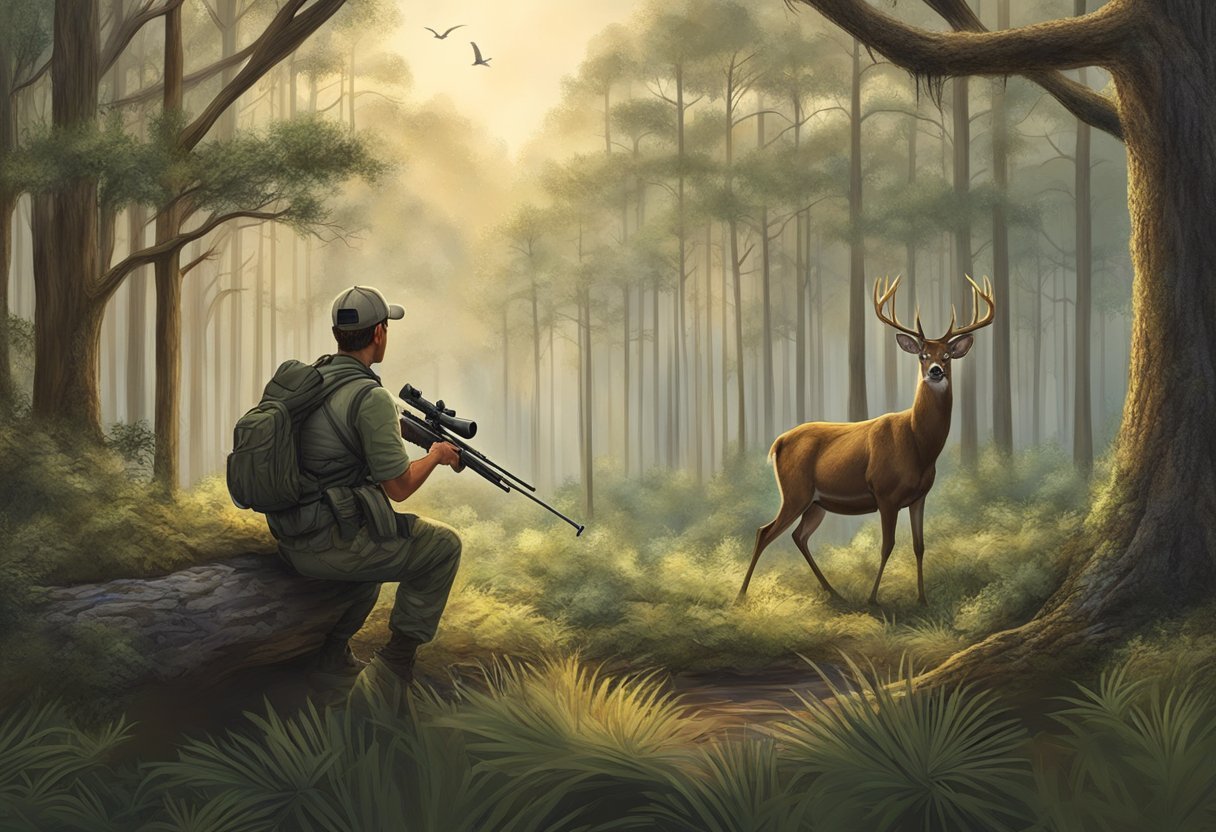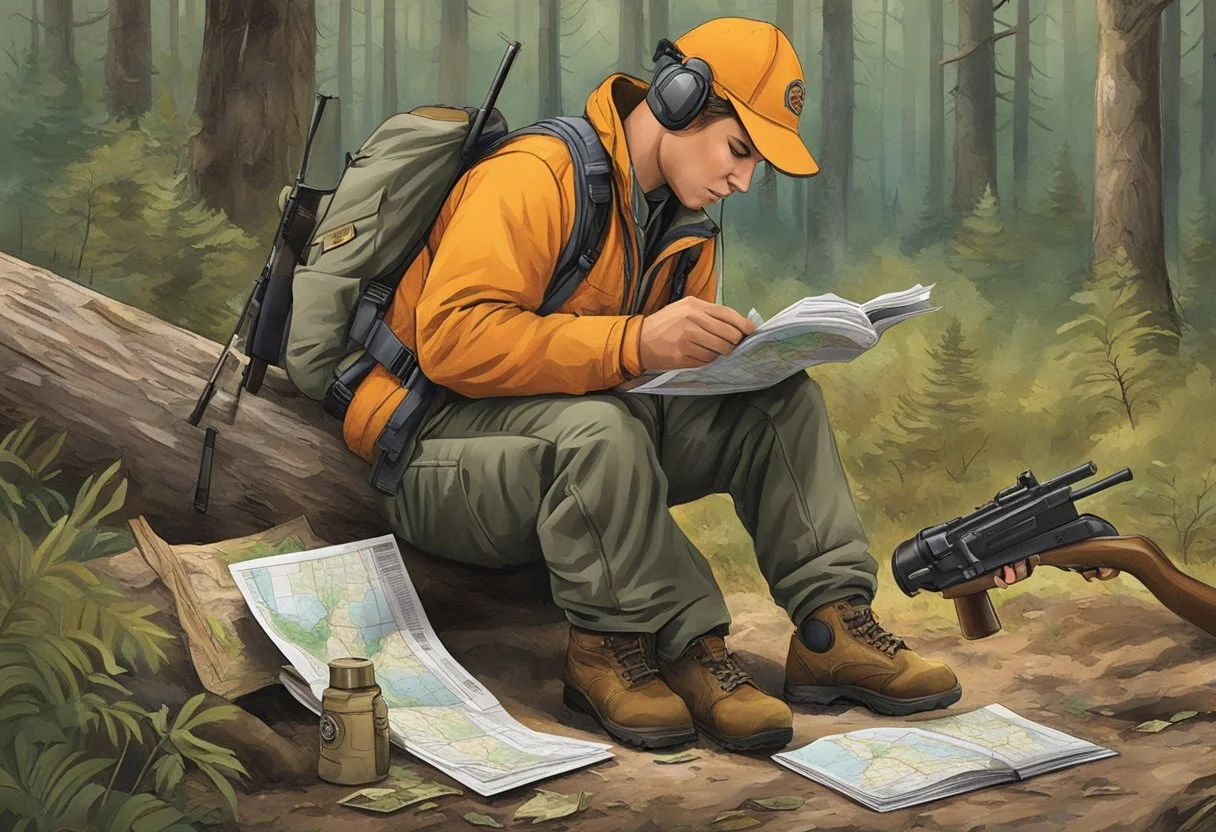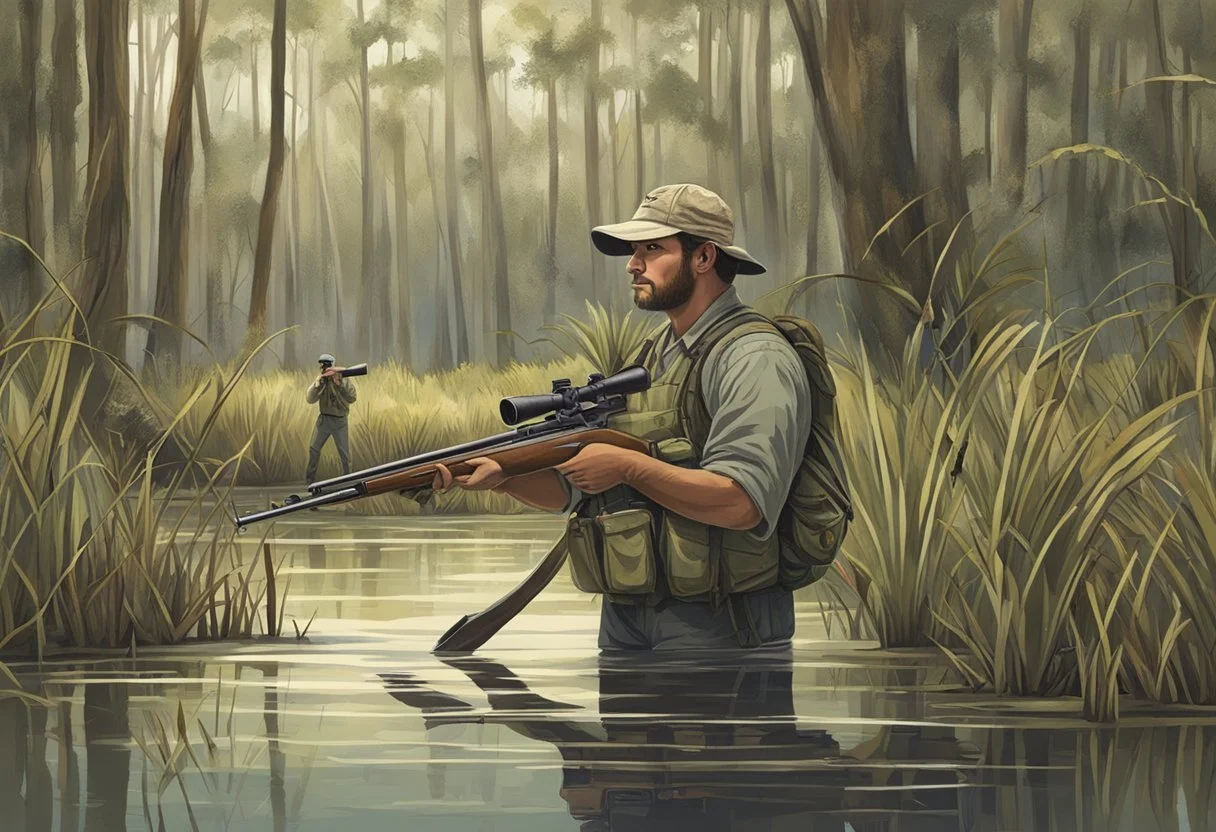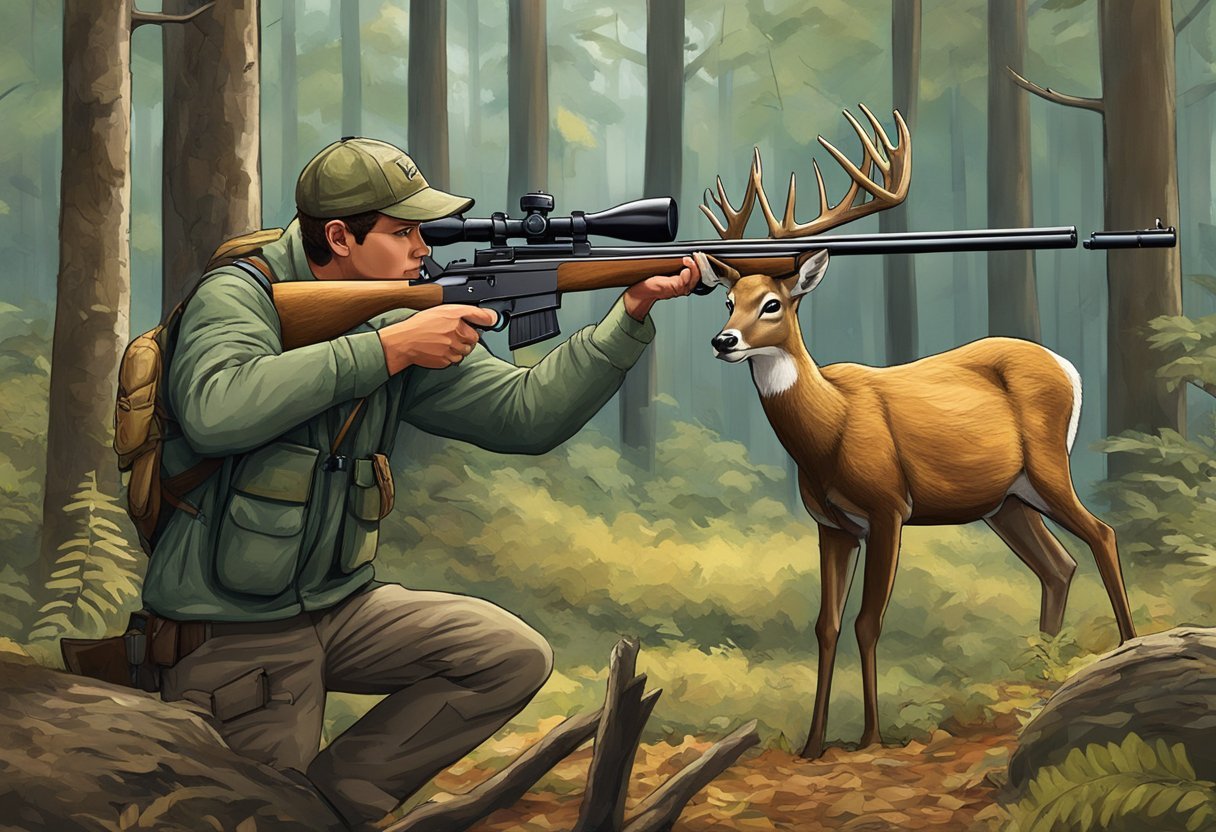Your Guide to Hunting in Louisiana
Essential Tips and Advice
This Article is Part of Our Hunting Guide for All 50 US-States
Louisiana, a state with lush landscapes and rich wildlife, offers a diverse range of hunting opportunities for beginners and experienced hunters alike. The variety of game animals across the state includes deer, wild turkey (What wine goes well with turkey?), and waterfowl, providing beginners multiple avenues to develop their skills. Additionally, Louisiana's natural resources, such as the abundant wetlands and swamps, contribute to unique hunting experiences that are sure to captivate hunters of all levels.
Before venturing into the Louisiana wilderness, beginners should familiarize themselves with the state's hunting laws and regulations, ensuring a safe and responsible hunting experience. It is essential to acquire a hunting license, adhere to the hunting season boundaries, and acquire permission to hunt on private lands if applicable. Participating in a hunter education course, either online or in-person, is highly recommended, as it provides essential knowledge on hunting techniques, safety, and ethics.
As a beginner, mastering the art of hunting in Louisiana requires patience and persistence. Many beginners choose to join local hunting clubs or seek guidance from experienced hunters in order to gain knowledge and hone their abilities. With time, practice, and dedication, novice hunters will be able to better appreciate the thrill and responsibility of this cherished outdoor pursuit.
Understanding Hunting Regulations in Louisiana
Louisiana Department of Wildlife and Fisheries (LDWF) Overview
The Louisiana Department of Wildlife and Fisheries (LDWF) is the primary agency responsible for managing and conserving the state's wildlife resources. LDWF enforces hunting regulations and ensures that hunters follow specific rules for a safe and responsible hunting experience. For detailed information and updates on hunting regulations, it is always best to visit the LDWF website.
Essential Hunting Regulations
To hunt in Louisiana, you must first obtain a hunting license. Licenses are available for both residents and non-residents, with different types and fees depending on the intended hunting activity, age, and residency. You can purchase a license at an LDWF field office, authorized retailers, or online.
In addition to a hunting license, some specific game species require a special stamp or permit. For instance, hunters targeting waterfowl will need a Federal Duck (What wine goes well with duck?) Stamp and Louisiana Duck License. Furthermore, certain age groups, such as youths and seniors, may have different requirements and privileges.
It is crucial to familiarize yourself with the hunting rules and regulations in Louisiana, including firearm safety, hunter education, and the use of hunting dogs. Some regulations may vary depending on the area or hunting season. Always consult the LDWF website and the annual hunting regulations guide for the most up-to-date information.
Hunting Seasons and Bag Limits
Each year, the Louisiana Wildlife and Fisheries Commission sets specific dates for hunting seasons and maximum allowed bag limits for different game species. These regulations are designed to ensure sustainable wildlife populations and provide a fair opportunity for hunters.
Here is a general overview of hunting seasons in Louisiana:
Each game species has its own set of season dates and bag limits, which can be found on the LDWF website.
Note: The hunting seasons and bag limits mentioned here are subject to change. Always consult the current year's LDWF regulations before planning your hunting trip.
Wildlife Management Areas and Public Lands
Louisiana offers a variety of public lands for hunters to explore, including Wildlife Management Areas (WMAs) and other state-owned areas. WMAs are managed by the LDWF to provide quality habitat for wildlife species and ample hunting opportunities for the public.
Before hunting on public land, make sure to check the specific regulations and rules for each area, as they can differ from statewide regulations. Some public lands may require a separate Recreational Use Permit to access, and certain activities might be restricted.
In summary, understanding and following hunting regulations in Louisiana is essential for beginners. The LDWF provides resources and information to help hunters prepare for a safe and enjoyable experience. Always consult their website and stay updated with the latest rules and regulations. Happy hunting!
Hunting Licenses and Requirements
When planning a hunting trip in Louisiana, it is essential to understand the licensing requirements, types of/licenses available, and the legal equipment necessary for a safe and successful hunt. The Louisiana Department of Wildlife and Fisheries (LDWF) oversees and manages these aspects to ensure the conservation of wildlife and the safety of hunters.
Types of Hunting Licenses
In Louisiana, there are various types of hunting licenses available to cater to the needs of different hunters, including:
Basic Hunting License: This license covers the majority of hunting activities, excluding special species such as deer, turkey, and waterfowl.
Big Game License: This license is required for hunters targeting deer or turkey. It must be purchased in addition to the Basic Hunting License.
Waterfowl License: Hunters pursuing migratory waterfowl species must obtain this license in addition to the Basic Hunting License.
Youth Licenses: These are available for young hunters under the age of 16 and are often more affordable than adult licenses. Youth hunters must still follow all hunting regulations and be accompanied by a licensed adult.
Resident and Non-Resident Licenses
Hunting licenses in Louisiana are available for both residents and non-residents. A resident is defined as someone who has lived in the state for at least 6 months. The cost and available licenses differ for these two categories:
Residents:
Basic Hunting License: $15
Big Game License (deer and turkey): $14
State Waterfowl License: $5.50
Non-Residents:
Basic Hunting License (5-Day Trip): $29
Big Game License (deer and turkey): $150
State Waterfowl License: $25
The LDWF also offers a range of lifetime licenses that cover various hunting activities and requirements. These lifetime licenses are more cost-effective for frequent hunters and future residents of Louisiana.
Legal Hunting Equipment
When hunting in Louisiana, it is crucial to use approved equipment. Legal hunting tools and devices are categorized for firearm, archery, and primitive weapon hunting. Below is a brief outline of each category's permissible equipment:
Firearms and Ammunition:
Rifles: Centerfire rifles are allowed for hunting big game, excluding migratory birds. .22 caliber or smaller rimfires can be used for small game hunting.
Shotguns: An ideal choice for small game and waterfowl hunting, shotguns of 10-gauge or smaller with a plug limiting magazine capacity to 3 shells, are legal.
Ammunition: Non-toxic shot is required for migratory bird hunting.
Archery Equipment:
Bow and Arrow: Compound bows, longbows, and recurve bows are permitted for hunting. Hunters should use arrows with broadhead points.
Crossbow: Hunters can use crossbows during archery-only seasons or any firearm season with a valid hunting license.
Primitive Weapons:
Muzzleloading firearms: Permitted during designated primitive weapon seasons, muzzleloaders come in various categories depending on specific hunting activities.
Always consult the LDWF hunting regulations for the most up-to-date and accurate information regarding legal hunting equipment and licensing requirements.
Preparation for Hunting
Selecting the Right Hunting Gear
Before embarking on a hunting trip in Louisiana, it's essential to have the appropriate equipment. Here's a list of some critical items to gather:
Firearm or bow: Choose the appropriate weapon for the type of game you plan to hunt. Shotguns, rifles, and muzzleloaders are common choices.
Ammunition: Select the right caliber or shot size for the game you are targeting.
Clothing: In Louisiana's distinct climates, wear suitable attire with camouflage patterns or hunter orange, depending on your hunting area and season.
Footwear: Opt for comfortable, waterproof boots adaptable to the region's various terrains.
Binoculars: Enhance scouting efforts with binoculars to spot wildlife.
License and permits: Obtain the necessary hunting license and permits for the specific game you intend to hunt.
Navigational tools: Utilize maps, compasses, and GPS devices to navigate Louisiana's diverse lands.
Hunting Safety and Best Practices
Adhering to hunting safety rules and best practices is crucial to ensure a smooth and enjoyable experience. Keep the following points in mind:
Firearm safety: Handle firearms safely by always treating them as if they are loaded. Keep your finger off the trigger until ready to shoot, and point the muzzle in a safe direction at all times.
Hunter education: Complete a hunter education course, which is required by law in Louisiana.
Communication: Inform someone of your hunting plans, including the location, duration, and expected return time.
First Aid: Carry a basic first aid kit and know how to use it properly.
Ethical hunting: Respect wildlife, fellow hunters, and landowners by following ethical hunting practices.
Scouting and Understanding the Land
Understanding the lay of the land is essential for successful hunting. In Louisiana, hunters have access to both public and private lands, each with its unique characteristics:
Public land: Louisiana's Wildlife Management Areas (WMAs) offer diverse hunting opportunities. Familiarize yourself with WMA rules, regulations, and maps, which can be found on the Louisiana Department of Wildlife and Fisheries website.
Private land: Acquire permission from landowners before scouting or hunting their property. Building respectful relationships with landowners can grant hunters access to well-kept hunting lands.
Scouting: To increase your chances of spotting game, scout the area ahead of time. Identify key features such as food sources, bedding areas, and travel routes that attract wildlife.
By prioritizing gear selection, safety measures, and understanding Louisiana's hunting lands, beginning hunters can embrace this longstanding tradition and way of life in the region.
Big Game Hunting in Louisiana
White-Tailed Deer Hunting
White-tailed deer are a popular big game animal in Louisiana, as they are plentiful and can be found in both public and private lands. Hunters are required to follow the specific hunting seasons, bag limits, and regulations set forth by the Louisiana Department of Wildlife and Fisheries.
When hunting white-tailed deer, beginner hunters should remember a few key tips for success:
Scout the area thoroughly during the pre-season to locate the deer's preferred habitat and understand their movements.
Focus on food sources and water sources where deer are most likely to be found.
Practice ethical hunting techniques, such as ensuring clean and humane shots, avoiding overly stressful tactics, and respecting the land.
Alligator Hunting
Alligator hunting is a unique and thrilling experience in Louisiana. Strict regulations are in place to maintain a healthy alligator population and ensure the safety of both hunters and the public. Those who want to hunt alligators must obtain an alligator hunting license and possibly tags or permits as well, depending on the hunting location.
Some important points for beginner alligator hunters include:
Most alligator hunting occurs on private land where landowners coordinate with licensed hunters.
Public lands with alligator hunting opportunities are accessible through lottery drawings.
Familiarize yourself with different hunting methods, such as baiting, hook and line, and using firearms.
Wild Boar Hunting
Wild boars, also known as feral hogs, are invasive species in Louisiana and cause significant damage to the environment and agriculture. Consequently, they can be hunted year-round and with no bag limits on private land. On public land, hunters must still adhere to specific hunting seasons.
Here are some tips to help beginners with wild boar hunting in Louisiana:
Locate their feeding areas, such as agricultural fields, where hogs cause considerable crop damage.
Spot-and-stalk hunting and baiting are commonly used methods for hunting wild boars.
Be cautious when approaching wild boars, as they can be aggressive and pose danger to hunters, especially wounded animals.
By following proper regulations and guidelines, beginner hunters can have an enjoyable and successful big game hunting experience in Louisiana.
Small Game and Bird Hunting
When it comes to hunting in Louisiana, small game and bird hunting opportunities are abundant. From squirrels and rabbits to migratory game birds like ducks, geese, and woodcocks, the state offers a variety of options for hunters of all skill levels.
Squirrel and Rabbit Hunting
Squirrel and rabbit hunting are perfect for beginners, as these small game species have a simple set of regulations and are found throughout Louisiana. Squirrels are especially plentiful in the state's hardwood forests, while rabbits can be found in both forests and open grasslands. Some popular squirrel species to pursue include:
Gray squirrels
Red squirrels
For rabbit hunting, hunters primarily target two species: the Eastern Cottontail and the Swamp Rabbit. Regardless of the hunted species, it is important to follow applicable regulations and ensure you possess the necessary hunting licenses and permits.
Waterfowl and Duck Hunting
Waterfowl hunting in Louisiana often means focusing on ducks and geese, particularly migratory birds that flock to the state's expansive wetlands during the winter months. Some common duck species hunted in Louisiana include mallards, teal, pintails, and wood ducks. Popular geese species include Canada geese and Snow geese.
To maximize the chances of a successful hunt, consider using a blind, decoys, and duck calls. When it comes to licensing and permits, be aware that waterfowl hunting typically requires a migratory bird hunting permit in addition to the standard hunting license.
Here is a brief summary of popular waterfowl species for hunting in Louisiana:
Duck Species Goose Species Mallards Canada Geese Teal Snow Geese Pintails Wood Ducks
Turkey and Quail Hunting
Turkey hunting in Louisiana can be both challenging and rewarding. The state is home to the Eastern wild turkey, a highly sought-after game bird. Springtime is a popular season for turkey hunting, as male turkeys, known as "toms" or "gobblers," are particularly vocal and more easily located.
Quail hunting, on the other hand, is equally engaging and primarily targets the Northern Bobwhite. Nevertheless, quail populations have been declining in recent years, making it a more challenging pursuit. Always respect bag limits and seasons in order to help conserve these game bird populations.
Whether you're a novice or experienced hunter, Louisiana offers diverse small game and bird hunting opportunities to suit your preferences. With proper licensing, permits, and adherence to regulations, hunters can enjoy the thrill of the hunt within the state's rich and varied landscape.
Hunters and Conservation
The Role of Hunters in Ecosystem Management
Hunters play a vital role in ecosystem management in Louisiana. Through regulated hunting, they help balance wildlife populations and prevent overpopulation. This balance is essential for maintaining healthy habitats and promoting biodiversity. For example, when deer populations become too high, they over-browse certain plant species, which in turn affects other wildlife that depend on these plants for food and shelter.
Moreover, hunting license fees, as well as taxes collected on hunting equipment, contribute to crucial funding for conservation efforts. In Louisiana, these funds go toward management, research, and education programs that allow the state to assess and improve wildlife habitats and ecosystems.
Controlling Invasive Species
Invasive species are a significant threat to Louisiana's native wildlife and ecosystems. Hunters contribute to controlling invasive species through targeted hunting efforts. For example, the invasive nutria, an aquatic rodent native to South America, is known to cause severe damage to wetland habitats. Louisiana Wildlife and Fisheries has established a Nutria Control Program which encourages hunters to help reduce nutria populations, thereby minimizing the damage they cause to Louisiana's delicate ecosystems.
Ethical Hunting Practices
Ethical hunting practices are crucial to hunters' role in conservation. These practices include:
Understanding and adhering to hunting regulations: Hunters must be familiar with and follow all applicable hunting laws and regulations, such as obtaining proper permits and respecting established seasons for different species and regions.
Practicing good sportsmanship: Hunters should treat other hunters, landowners, and wildlife with respect.
Using appropriate hunting equipment: This ensures that the hunting experience is both safe and effective, minimizing the potential for injuring rather than killing the targeted species.
A commitment to conservation: Ethical hunters are dedicated to preserving wildlife populations and habitats for future generations.
By adhering to these practices, hunters not only demonstrate their commitment to conservation but also their responsibility towards sustainable and ethical hunting. This, in turn, contributes to maintaining Louisiana's rich and diverse ecosystems, which benefits both humans and wildlife.
The Hunting Experience
Traditional Hunting Methods
In Louisiana, hunting has long been a way of life where tradition and culture play an important role. For generations, traditional methods have been used to hunt alligator, deer, duck, rabbit, and other game. These methods often involve the use of simple tools like bows and arrows or trapping techniques. For example, many hunters continue to use slingshots for small game hunting. Additionally, dog hunting has been a common practice for managing prey, such as deer and hogs, in the southern part of the state.
Modern Hunting Technologies
While traditions remain strong, new technologies have also made inroads into the Louisiana hunting scene. In recent years, modern equipment like GPS tracking systems, trail cameras, and precision rifles have become more prominent. These advancements allow hunters to track, monitor, and perfect their approach to their prey, leading to a greater chance of success. Some of the most popular modern tools include:
Compound and crossbows: Provide increased accuracy, speed, and power compared to traditional bows
Optics: Advanced scopes and rangefinders aid shooters in targeting their game from greater distances
Hunting clothing and gear: Innovative fabrics and materials help ensure that hunters remain warm, dry, and camouflaged in various weather conditions
Hunting as a Cultural Tradition
In Louisiana, hunting is deeply rooted in the culture, passed down from generation to generation. It's not just about the thrill of the hunt or providing for one's family; it's about heritage and preserving a way of life. With a rich history of Indigenous people, Acadians, and Creoles, there is a strong sense of pride in the shared traditions that encompass these diverse communities.
Hunting also promotes conservation, as hunters contribute financially through license fees and taxes that help maintain the environment and preserve habitats for future generations to enjoy. Moreover, community gatherings such as wild game cook-offs emphasize the communal nature of Louisiana hunting and the way in which it bonds people together.
In summary, the hunting experience in Louisiana is defined by its blend of traditional methods and modern technologies. It is further characterized by the rich cultural heritage and the preservation of a way of life that remains highly valued by the state's residents.
Special Hunting Opportunities and Programs
Lottery Hunts and Special Permits
Louisiana offers a variety of lottery hunts and special permits to provide unique hunting opportunities for both residents and non-residents. These hunts are conducted in specific wildlife management areas and offer limited access to high-quality hunting experiences. One of the most sought-after lottery hunts is the Louisiana alligator hunt, which occurs annually and requires a special permit to participate.
In addition to alligator hunts, there are lottery hunts for deer, turkey, and waterfowl on selected public lands throughout the state. Participants in these hunts must apply for a special hunt permit and if successful, will be selected through a random drawing. Applications can be submitted online or via mail, depending on the hunt. It's important to note that deadlines for applications may vary for different hunts, so interested hunters should regularly check the Louisiana Department of Wildlife and Fisheries (LDWF) website for updated information.
Youth and Beginner Programs
Louisiana is also dedicated to fostering a love for hunting among younger and new hunters, and the LDWF offers special youth hunting and beginner hunting events to support this goal. These programs are designed to provide a safe, educational, and enjoyable environment for youth and beginners to learn about hunting and assisting with the process.
Youth Hunting Opportunities: Louisiana hosts special hunts exclusively for youth participants, typically under the age of 17. These hunts include deer, turkey, and waterfowl hunts organized on specific wildlife management areas. Youth hunts aim to provide young hunters with a high-quality experience, often with lowered hunting pressure compared to general season hunts.
Beginner Hunting Programs: The LDWF also offers beginner hunting programs, such as the "Becoming an Outdoors Woman" program, which targets not only women but also any adult new to hunting. These programs provide instruction on various hunting techniques, safety practices, and ethical hunting behavior. Additionally, some beginner programs offer participants mentorship opportunities to guide them through their first hunting experiences.
By taking advantage of these lottery hunts, special permits, and youth and beginner programs, novice hunters in Louisiana can gain the knowledge, skills, and experience necessary for a successful and enjoyable hunting career.
Conclusion
Planning Your First Louisiana Hunt
When planning a beginner's hunting trip in Louisiana, it is essential to consider several factors that will contribute to a successful and enjoyable experience. By being well-prepared, new hunters can get the most out of their time spent in the outdoors and develop skills that will serve them well in future hunts.
First and foremost, research and select the appropriate game species and hunting location. Louisiana offers a diverse range of species available for hunting, including white-tailed deer, waterfowl, and wild turkey. To make an informed decision, consider habitat requirements, season dates, and potential hunting techniques or equipment needed for each species. Consult Louisiana Department of Wildlife and Fisheries (LDWF) resources for detailed information and localized recommendations.
Species Habitat Season Dates Equipment Deer Forests, Swamps Oct-Feb Rifle, Archery Waterfowl Wetlands Nov-Feb Shotgun, Duck Calls Wild Turkey Hardwood Forests April-May Shotgun, Camouflage
Second, familiarize yourself with Louisiana's hunting regulations and requirements. Obtain a valid hunting license and any necessary permits, as well as complete any mandatory hunter education courses. Also, review bag limits, hunting hours, and any specific rules or restrictions relevant to the chosen species. Compliance with these regulations is crucial to ensure sustainable wildlife populations and responsible hunting practices.
Lastly, be prepared with the right gear and safety precautions. Invest in quality clothing and boots that provide warmth and comfort during extended periods outdoors. Camouflage clothing can be beneficial in blending into the surrounding environment for certain species. Pack a well-stocked first-aid kit, a GPS or detailed map, a compass, and plenty of food and water.
In summary, a successful first-time hunting experience in Louisiana requires careful planning, adherence to local regulations, and proper equipment. By following these guidelines, beginners can cultivate essential skills, foster respect for their quarry, and learn valuable lessons in the great outdoors. As they grow more confident and knowledgeable, they will undoubtedly find enjoyment and fulfillment in the pursuit of a variety of Louisiana's game species.






